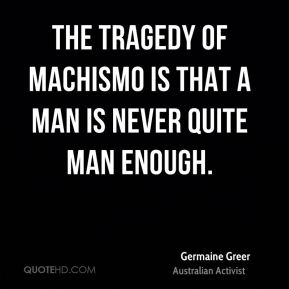
Richard Basham uses an Anthropological lens when examining this idea of “Machismo” that we continue to come across in our readings. In Frontiers: A Journal of Women Studies, Basham defines Machismo as “…loosely translated as “the cult of the male…characterized by sexual prowess, zest for action; including verbal action, daring, and, above all, absolute confidence” (127). This definition, at least in my perspective, really connects to the poem of I am Joaquin and Plan Espiritual de Aztlan, as both literary works, are “…characterized by sexual prowess, zest for action; including verbal action, daring, and, above all, absolute confidence” (127). For example, in Plan Espiritual de Aztlan, there is a part that states,
“…Brotherhood unites us, and love for our brothers makes us a people whose time has come and who struggles against the foreigner “gabacho” who exploits our riches and destroys our culture. With our heart in our hands and our hands in the soil, we declare the independence of our mestizo nation. We are a bronze people with a bronze culture. Before the world, before all of North America, before all our brothers in the bronze continent we are a nation, we are a union of free pueblos, we are Aztlán.”
At the core of this quote, it is male centered expressing the very characteristics that Basham discusses in his article on “Machismo”. First, we see “the cult of the male” when the plan refers to “brotherhood-.” Nowhere in the plan does it express sisters or sisterhood, it is gendered, very male dominated, rooted in this concept of heteropatriarchal that Richard Rodriguez, author of Next of Kin: The Family in Chicana/o Cultural Politics (2009) refers to in his book. Second, the plan is quite “daring.” Third, there is “verbal action” in the plan. Machismo, which informs gender and sexual inequalities in Chicana/o culture, is explicit in this plan. Not only does the Plan Espiritual de Atzlan present “machismo” characteristics outlined by Basham, but I am Joaquin does too. For example, the poem states, “…I look at myself, I watch my brothers. I shed tears of sorrow…” Again, the poem embraces a “cult of the males,” it goes on to mention Pancho Villa, Zapata, Miguel Hidalgo, among other male influences not acknowledging female influences that also deserve recognition who have impacted Chicana/o history. All in all, we capture some of the first works that paved a path for the Chicana/o Movement and Chicana/o Studies-works that are very gendered rooted in patriarchy.
Basham, Richard. “Machismo.” Frontiers: A Journal of Women Studies 1.2 (1976): 126-43. Web.
